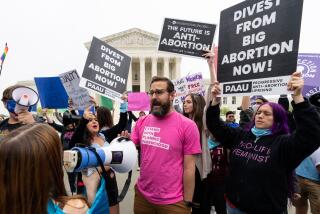Hospitals Can Sue States Over Medicaid Costs
- Share via
WASHINGTON — In a potentially costly defeat for state and federal governments, the Supreme Court ruled Thursday that hospitals may sue in federal court to obtain a “reasonable and adequate” reimbursement for treating needy patients.
Since 1965, the government has required hospitals to treat the poor under the Medicaid program, and it has promised in law that they would be paid for their services. Increasingly, however, neither state nor federal officials have lived up to that promise.
Hospitals in California were paid an average of only 61% of the cost of treating needy patients last year and were shortchanged nearly $1 billion under MediCal, according to figures compiled by the California Assn. of Hospitals and Health Systems.
On a 5-4 vote, the high court said that hospitals have a right to get a “reasonable and adequate” reimbursement and may go to a federal court to seek the money.
“This is an extremely important ruling for us,” said Christine Hall, general counsel for the state hospital association in Sacramento. “We have been giving millions of dollars in uncompensated care. It is critical for us to be able to go to court to challenge the reimbursement policies.”
Faced with higher costs and inadequate reimbursements, many hospitals have cut back services to the poor. In other instances, they have passed on the costs of treating poor patients to patients who pay and to those patients’ insurance companies.
The Medicaid program is funded jointly by the federal and state governments. The U.S. government, which pays at least 50% of the program’s cost, sets general regulations, but states devise their own reimbursement formulas for hospitals.
In 1980, Congress passed legislation commonly called the Boren Amendment that requires the states to pay hospitals a “reasonable and adequate (reimbursement) to meet the costs, which must be incurred by efficiently and economically operated facilities.”
Each year, the states assure Washington that their payment levels are reasonable--even though the hospitals say that they are being badly shortchanged.
Four years ago, the Virginia Hospital Assn. filed a lawsuit against the state, contending that the 1980 amendment gave the hospitals a civil right that could be enforced in federal court. Last year, an appeals court in Richmond, Va., agreed, but the Virginia governor filed an appeal with the Supreme Court.
Speaking for the court Thursday, Justice William J. Brennan Jr. said the “Boren Amendment to the Medicaid Act creates a right, enforceable in a private cause of action” by the hospitals to seek a reasonable and adequate reimbursement from the state.
Brennan’s decision in the case (Wilder vs. Virginia Hospital Assn., 88-2043) was joined by Justices Byron R. White, Thurgood Marshall, Harry A. Blackmun and John Paul Stevens. The dissenters, led by Chief Justice William H. Rehnquist, contended that the reimbursement policies are to be decided by state and federal officials, not the courts.
Duke University law professor Walter Dellinger said that the ruling marks a major shift in how the Medicaid program will be funded.
“For a quarter of a century, it has been the public policy of the United States to provide medical treatment to the very poorest Americans,” said Dellinger, who represented the Virginia hospitals. “The court has now recognized that Congress intended this cost to be borne by the federal and state governments, not by the hospitals.”
Dellinger said that Virginia hospitals were losing about $1 million a week treating Medicaid patients. “Now they can go to court to get an adequate level of reimbursement,” he said.
A brief filed on behalf of the 50 states had urged the court to overturn the Virginia ruling, arguing that their hard-pressed treasuries could be hit with hundreds of millions of dollars in higher costs. The Bush Administration also had urged the court to rule for the states. In 1988, the Medicaid program cost the federal government $29 billion.
If federal courts were to rule that hospitals deserve reimbursement for the full cost of treating Medicaid patients, the states could face billions of dollars in higher costs.
Officials of the Department of Health Services in Sacramento refused to comment on the high court ruling Thursday, saying that they had not yet had a chance to read it.
More to Read
Get the L.A. Times Politics newsletter
Deeply reported insights into legislation, politics and policy from Sacramento, Washington and beyond. In your inbox twice per week.
You may occasionally receive promotional content from the Los Angeles Times.











